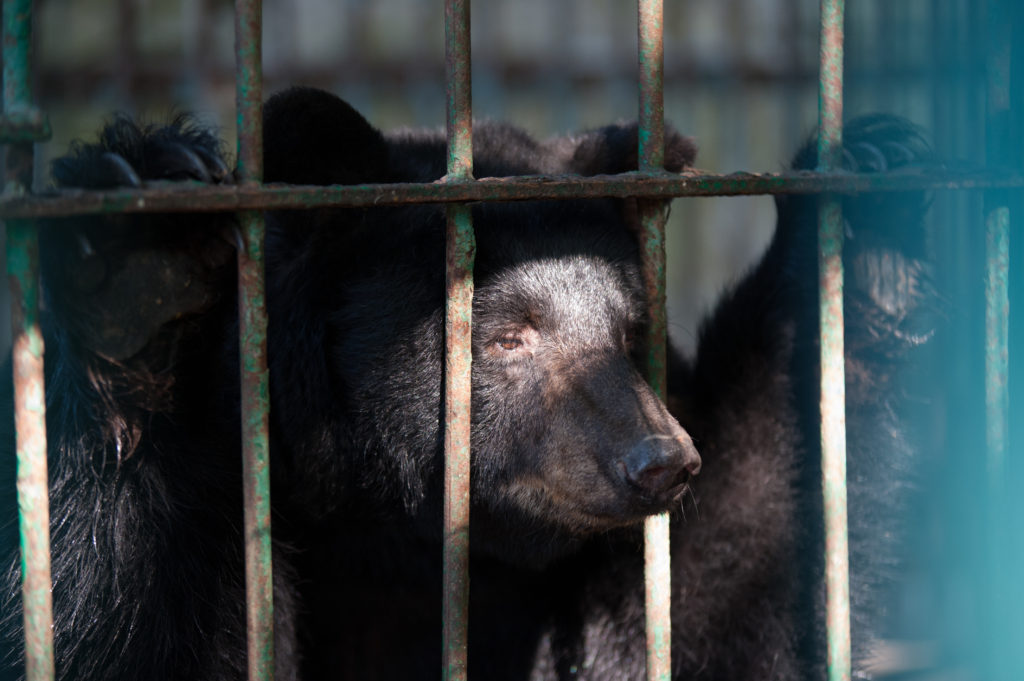
Keeping Bears Whole: Stopping Trade in Gallbladders and Bile to Crack Down on Global Poaching Rings
Julie Marshall
National Communications Coordinator
Animal Wellness Action, the Animal Wellness Foundation, Center for a Humane Economy, and several other organizations and U.S. lawmakers have this month introduced legislation to protect the world’s eight species of bears from poaching and wildlife trafficking rings.
The Bear Poaching Elimination Act, by forbidding any interstate transport or foreign sales of gallbladders and bile, seeks to eliminate the killing of bears for trafficking of a single body part of the animals — similar in intent to U.S. policies that seek to halt trade in rhino horns, ivory, and shark fins.

In addition to seeking gallbladders from bears poached in the wild, China has long operated “bear farms,” with the animals kept in pits and abused, to drain bile from their bladders with no pain-killing agents or antiseptic treatments. The end use of the bile from poached or “farmed” bears is employed as a palliative or treatment in Traditional Chinese Medicine.
Bear farms are being phased out in South Korea and Vietnam, and while that decline is a very good outcome, it will result in greater demand of bile from wild bears, with North America having the biggest populations of bears in the world and therefore representing the biggest target for poachers.
In 2022, a new threat to bears emerged. The Chinese Ministry of Health announced that bear bile was an acceptable palliative treatment for COVID-19, with surges in infections threatening bears throughout the world. China already had one enormous surge in COVID-19 cases, and others may follow.
“We shouldn’t be killing rhinos for their horns, elephants for their tusks, or bears for their bladders,” said Wayne Pacelle, president of Animal Wellness Action and the Center for a Humane Economy. “There are accepted alternatives to bear bile in Traditional Chinese Medicine and conventional medicine, so there’s just no need for this trade. It should be shut down.”
Forty states have laws on the books to address this trade, revealing the emerging consensus to address this problem. The Bear Poaching Elimination Act is needed to make a global statement about the trade from the United States, and to address gaps or inconsistencies in state laws. A trafficker in Colorado may face up to three years in prison and a $100,000 fine, while a trafficker in Kentucky may receive only a $100 fine. Federal sentencing guidelines dictate that the market value of the item must be at least $350 for a prosecution under the federal Lacey Act, but the courts attribute the value of a gallbladder to only $280.
Previous Issue
Oregon Lawmaker Fights for Primates in Wake of FDA Modernization Act
Julie Marshall National Communications Coordinator It sounds insane, the stuff of a...
Read MoreLarge Sums Secured for Horse Protection Act and Alternatives to Animal Testing
Julie Marshall National Communications Coordinator The latest Congressional spending bill to fund...
Read MoreDrone Footage of Animal Fighting Exposes States with Weak Laws, Highlights Health Risks
Julie Marshall National Communications Coordinator Criminals involved in animal fighting know they...
Read MoreBig Cat Public Safety Act Passed. Now What?
Julie Marshall National Communications Coordinator We won a crucial battle for big...
Read MoreLandmark Ruling After 18 Years Puts Poultry Industry on Losing End
Julie Marshall National Communications Coordinator Talk about persistence. And patience. Eighteen years...
Read MoreForty states have laws on the books to address this trade, revealing the emerging consensus to address this problem. The Bear Poaching Elimination Act is needed to make a global statement about the trade from the United States, and to address gaps or inconsistencies in state laws.